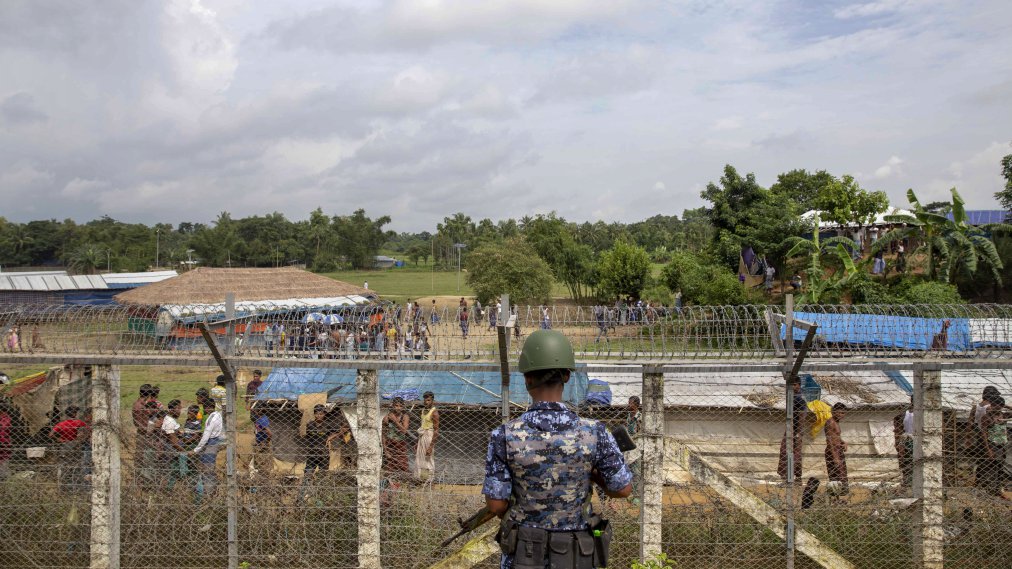U.N. Investigators Renew Call for Myanmar Military Officials to Face Genocide Charges
ASIA-UPDATES ON MYANMAR ROHINGYA GENOCIDE, 24 Sep 2018

Myanmar border guard police patrol the fence in the “no man’s land” zone between Myanmar and Bangladesh border as seen from Maungdaw, Rakhine state during a government-organized visit for journalists on August 24, 2018. – A repatriation plan in tatters and funding fast fading for a million refugees with burgeoning needs, Rohingya Muslims who fled Myanmar to Bangladesh face a grim future after the latest round of a decades-old conflict. PHYO HEIN KYAW/AFP/Getty Images
18 Sep 2018 – U.N. investigators renewed their call today for the investigation and prosecution of Myanmar’s top military officials for genocide and war crimes, publishing an exhaustive account of atrocities allegedly committed against the country’s Rohingya Muslims and other minorities.
More than 700,000 Rohingya, a persecuted and mostly stateless minority, have fled across the border into Bangladesh since August last year when the Myanmar military launched a brutal crackdown in response to an attack by Rohingya insurgents. Refugees say they fled a campaign of arson, rape and murder that saw entire villages burned to the ground.
In the wake of a similar campaign of violence that began in October 2016, the U.N. Human Rights Council established an international fact-finding mission to investigate allegations of abuses in Rakhine state, where the Rohingya are from, as well as the war-ravaged states of Shan and Kachin. Though they were repeatedly denied visas to Myanmar, investigators drew on documentary evidence, satellite imagery and 875 interviews over the course of 15 months.
Myanmar authorities deny the allegations, while the U.N., journalists and aid workers are largely barred from affected areas. Earlier this month, a Myanmar court sentenced two Reuters reporters to seven years in prison for investigating the military’s role in a massacre of 10 Rohingya men and boys.
Read more: Myanmar’s Case Against Reuters Reporters Is a War on Truth
The mission presented its full findings to the Human Rights Council in a 440-page report. It found that the Myanmar military, known locally as the Tatmadaw, “systematically” targeted civilians with acts of sexual violence, torture, and forced labor. In Rakhine, the report said, the Military’s conduct resembled a “veritable check-list” of crimes “calculated to bring about the physical destruction of the Rohingya group, as an underlying genocidal act.”
The thee-member mission called on the U.N. Security Council to refer Myanmar to the International Criminal Court or establish an alternative tribunal.
“The top generals should be investigated and prosecuted for genocide in Rakhine State. I have never been confronted by crimes as horrendous and on such a scale as these,” said committee chair Marzuki Darusman, according to a news release.
The committee released preliminary findings last month accusing the military of demonstrating “genocidal intent” sufficient to justify a probe and prosecutions. A Myanmar government spokesperson rejected the panel’s conclusions, claiming that Myanmar has “zero tolerance for human rights violations.”
Myanmar’s delegate to the Human Rights Commission rejected the committee’s findings again on Tuesday, calling the report “one-sided.” But earlier this month, the ICC ruled that has legal jurisdiction to rule on Myanmar’s deportation of the Rohingya, opening the door for initial prosecutorial investigations.
Read more: Myanmar Generals Should Face Charges for Genocide, U.N. Says
On Tuesday, the commission also called for targeted sanctions against top military officials and an international arms embargo. It also recommended the military, which is not subject to civilian oversight under Myanmar’s 2008 Constitution, undergo a wholesale reorganization to reform a “toxic command climate” that supported impunity for rights abuses.
The mission also faulted Myanmar’s civilian authorities, led by Nobel laureate Aung San Suu Kyi, saying the government “contributed” to atrocities by blocking independent investigations and defending the military’s conduct.
“Ignorance on the part of the Myanmar civilian authorities was effectively impossible,” the report said.
DISCLAIMER: The statements, views and opinions expressed in pieces republished here are solely those of the authors and do not necessarily represent those of TMS. In accordance with title 17 U.S.C. section 107, this material is distributed without profit to those who have expressed a prior interest in receiving the included information for research and educational purposes. TMS has no affiliation whatsoever with the originator of this article nor is TMS endorsed or sponsored by the originator. “GO TO ORIGINAL” links are provided as a convenience to our readers and allow for verification of authenticity. However, as originating pages are often updated by their originating host sites, the versions posted may not match the versions our readers view when clicking the “GO TO ORIGINAL” links. This site contains copyrighted material the use of which has not always been specifically authorized by the copyright owner. We are making such material available in our efforts to advance understanding of environmental, political, human rights, economic, democracy, scientific, and social justice issues, etc. We believe this constitutes a ‘fair use’ of any such copyrighted material as provided for in section 107 of the US Copyright Law. In accordance with Title 17 U.S.C. Section 107, the material on this site is distributed without profit to those who have expressed a prior interest in receiving the included information for research and educational purposes. For more information go to: http://www.law.cornell.edu/uscode/17/107.shtml. If you wish to use copyrighted material from this site for purposes of your own that go beyond ‘fair use’, you must obtain permission from the copyright owner.
Read more
Click here to go to the current weekly digest or pick another article:
ASIA-UPDATES ON MYANMAR ROHINGYA GENOCIDE: